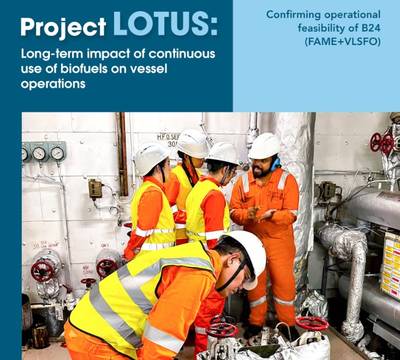NYK, GCMD Verify Long-Term Safety of Biofuels in Shipping
Nippon Yusen Kabushiki Kaisha (NYK) has completed a joint demonstration with Singapore-based Global Centre for Maritime Decarbonisation (GCMD) that verified the long-term use and storage of biofuel onboard ships, confirming its technical safety and sustainable usability.
The six-month trial, as part of Project LOTUS, involved continuous use of B24 biofuel on a pure car and truck carrier. Tests showed no adverse effects on engine performance or fuel supply systems, no signs of equipment wear or corrosion, and fuel stored onboard remained within ISO 8217 standards without microbial contamination, according to NYK.
B24 biofuel is a blend produced by processing used cooking oil and other feedstocks into FAME (Fatty Acid Methyl Esters, commonly known as biodiesel) at 24%, and very low sulfur fuel oil (VLSFO) at 76%.
The findings from the six-month trial which started in May 2024 confirm that biofuel can serve as a drop-in fuel, compatible with existing ship infrastructure, supporting immediate adoption. Results have been published on GCMD’s website to aid industry operators evaluating biofuel.
NYK and GCMD said the project demonstrates biofuel’s potential role in cutting greenhouse gas emissions and accelerating shipping’s decarbonization.
“Project LOTUS grounds the conversation around the extended use of biofuels in evidence. Our findings show that they can be deployed safely and reliably, providing a concrete pathway for shipping’s decarbonisation,” said Lynn Loo, GCMD Chief Executive Officer.
“The use of biofuels is one of the key options for advancing the sustainable development of the maritime industry. We hope that the outcomes of this project will offer new possibilities to those considering the adoption of biofuels and help accelerate their broader use in various fields,” added Nobuhiro Kashima, NYK Line Senior Managing Executive Officer.

















